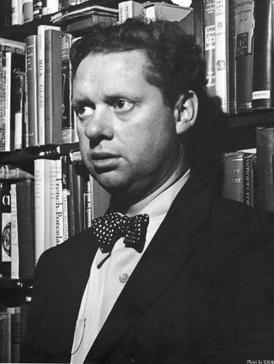
The Invader: a tale of adventure and passion is a novel by the Welsh author Hilda Vaughan. It was published in 1928 by Heinemann in the UK and by Harper & Brothers in the US.

The Invader: a tale of adventure and passion is a novel by the Welsh author Hilda Vaughan. It was published in 1928 by Heinemann in the UK and by Harper & Brothers in the US.
Daniel Evans, a tenant farmer, is forced out of his farm when Miss Webster inherits it from her uncle. [1] Through his tenacity, he attempts to regain his farm. [2] [3]
The Invader was Vaughan's third novel. [4]
Her husband, Charles Langbridge Morgan, persuaded her to delay its publication, on the grounds that her writing would improve. [5]
The novel was well received,and was described by Country Life as "one of the best novels of this year". [6]

Dylan Marlais Thomas was a Welsh poet and writer whose works include the poems "Do not go gentle into that good night" and "And death shall have no dominion", as well as the "play for voices" Under Milk Wood. He also wrote stories and radio broadcasts such as A Child's Christmas in Wales and Portrait of the Artist as a Young Dog. He became widely popular in his lifetime and remained so after his death at the age of 39 in New York City. By then, he had acquired a reputation, which he had encouraged, as a "roistering, drunken and doomed poet".

Welsh writing in English, is a term used to describe works written in the English language by Welsh writers.

Charles Langbridge Morgan was a British playwright and novelist of English and Welsh parentage. The main themes of his work were, as he himself put it, "Art, Love, and Death", and the relation between them. Themes of individual novels range from the paradoxes of freedom, through passionate love seen from within and without, to the conflict of good and evil and the enchanted boundary of death (Sparkenbroke). He was the husband of Welsh novelist Hilda Vaughan.
Invader, Invaders, The Invader or INVADER may refer to:

Crash is a 1996 Canadian drama film written, produced and directed by David Cronenberg, based on J. G. Ballard's 1973 novel of the same name. Starring James Spader, Deborah Kara Unger, Elias Koteas, Holly Hunter and Rosanna Arquette, it follows a film producer who, after surviving a car crash, becomes involved with a group of symphorophiliacs who are aroused by car crashes and tries to rekindle his sexual relationship with his wife.

Carreg Cennen Castle is a castle sited on a high rocky outcrop overlooking the River Cennen, close to the village of Trap, four miles south east of Llandeilo in Carmarthenshire, Wales. Castell Carreg Cennen means castle on a rock next to Cennen, the river name itself being a reference either to cen meaning lichen or perhaps a personal name.

The Great God Pan is a horror and fantasy novella by Welsh writer Arthur Machen. Machen was inspired to write The Great God Pan by his experiences at the ruins of a pagan temple in Wales. What would become the first chapter of the novella was published in the magazine The Whirlwind in 1890. Machen later extended The Great God Pan and it was published as a book alongside another story, "The Inmost Light", in 1894. The novella begins with an experiment to allow a woman named Mary to see the supernatural world. This is followed by an account of a series of mysterious happenings and deaths over many years surrounding a woman named Helen Vaughan. At the end, the heroes confront Helen and force her to kill herself. She undergoes a series of unearthly transformations before dying and she is revealed to be a supernatural entity.
This article is about the particular significance of the year 1945 to Wales and its people.
This article is about the particular significance of the year 1930 to Wales and its people.
This article is about the particular significance of the year 1928 to Wales and its people.
This article is about the particular significance of the year 1926 to Wales and its people.
Hilda Campbell Vaughan was a Welsh novelist and short story writer writing in English. Her ten varied novels, set mostly in her native Radnorshire, concern rural communities and heroines. Her first novel was The Battle to the Weak (1925), her last The Candle and the Light (1954). She was married to the writer Charles Langbridge Morgan, who had an influence on her writings. Although favourably received by her contemporaries, Vaughan's works later received minimal attention. Rediscovery began in the 1980s and 1990s, along with a renewed interest in Welsh literature in English as a whole.
Events from the year 1755 in Wales.

Vaughan Gething is a Welsh Labour and Co-operative politician serving as Minister for the Economy since 2021. He previously served as the Minister for Health and Social Services from 2016 to 2021. He has been the Member of the Senedd (MS) for Cardiff South and Penarth since 2011.

Blaenffos is a small village of around 200 inhabitants in the north of Pembrokeshire, Wales, in the community of Boncath. It sits on the boundary between the former parishes of Llanfihangel Penbedw and Castellan Chapelry.

The Campaign for the Protection of Rural Wales (CPRW) (Welsh: Ymgyrch Diogelu Cymru Wledig (YDCW)), originally named the Council for the Preservation of Rural Wales, is a charity in Wales that aims to secure the protection and enhancement of the country's landscapes and environment.
The Battle to the Weak is a novel by Welsh-born writer Hilda Vaughan.
Here are Lovers is a novel by Welsh author Hilda Vaughan.

Middlesbrough started as a Benedictine priory on the south bank of the River Tees, its name possibly derived from it being midway between the holy sites of Durham and Whitby. The earliest recorded form of Middlesbrough's name is "Mydilsburgh", containing the term burgh.